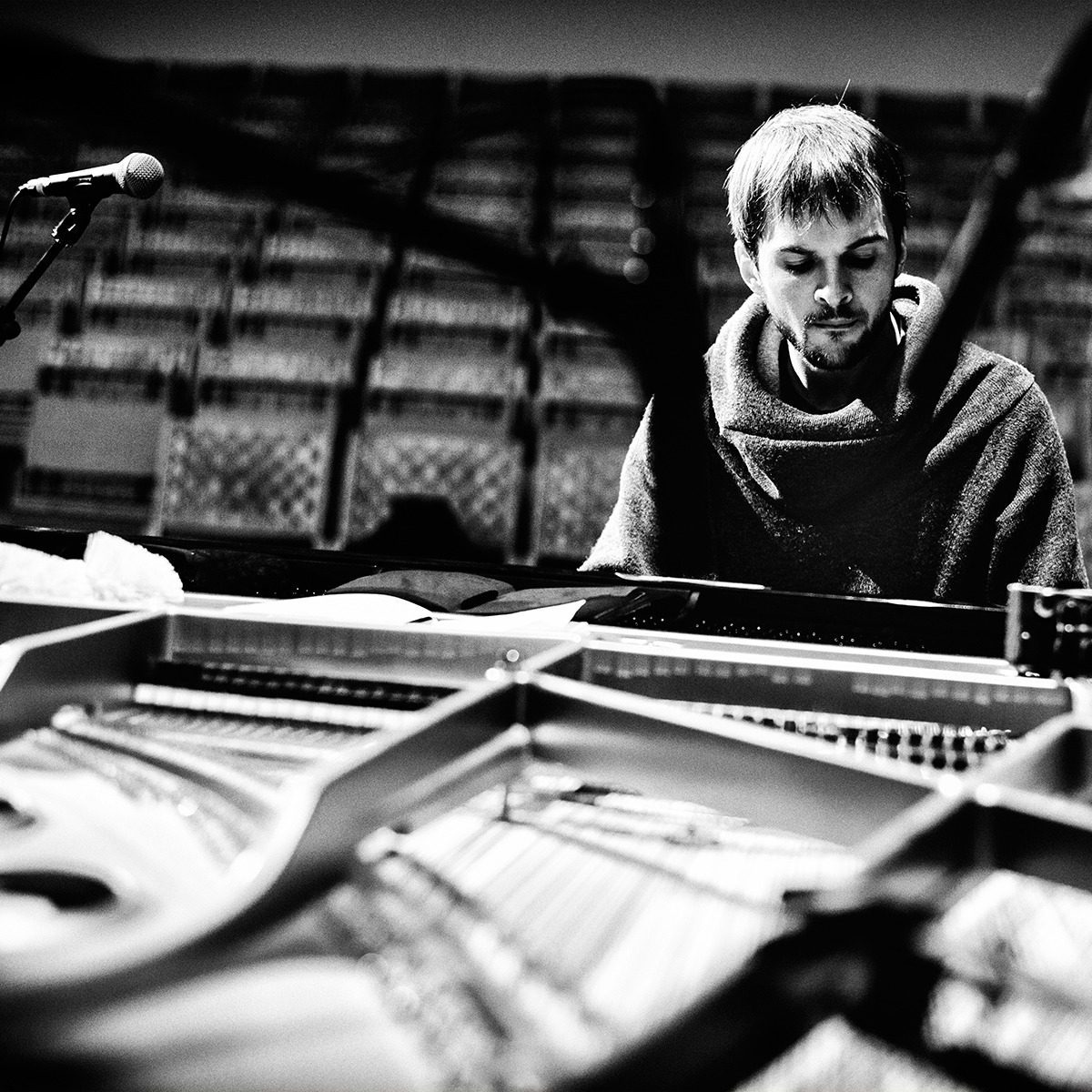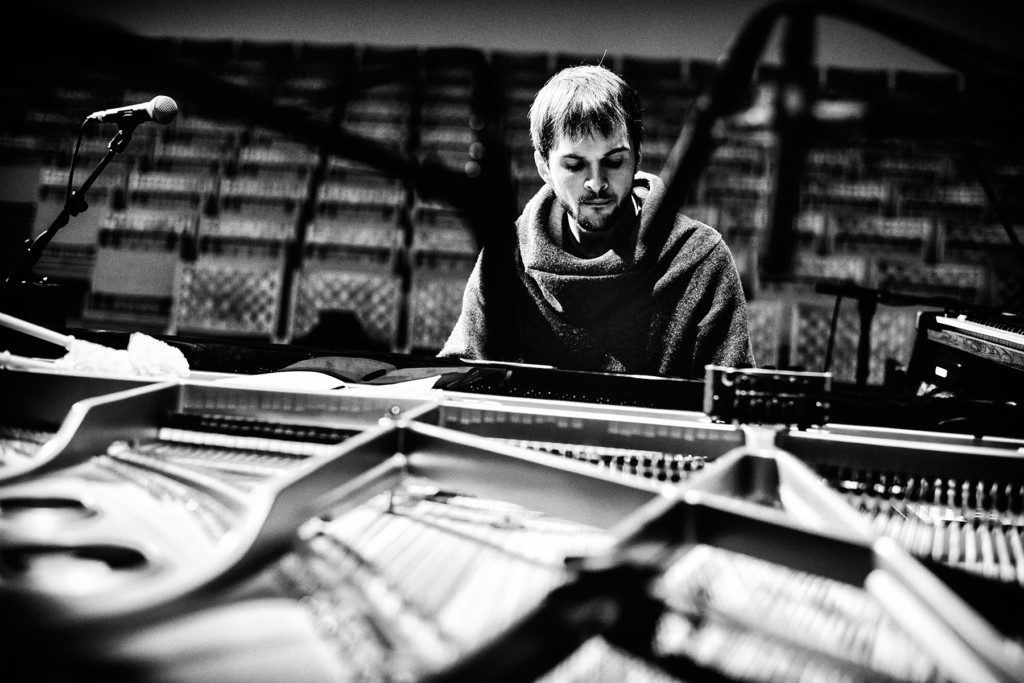
I like many used to work an insufferable desk job. To most people, it sounded very interesting, but it was not. It was bland, canned stew disguised as top sirloin. To paraphrase a brilliant Bruce Eric Kaplan cartoon: I grew tired of clicking things all day. My only refuge was that given the oppressively repetitive, brainless tasks I was to perform, I could listen to music for nine hours straight. So in a sense, without 40 plus hours of weekly tedium, it is quite possible I would have never heard the stunning music of German composer Nils Frahm.
It was Thursday, August 6th, 2015. I was dutifully at my desk, clicking away, and occasionally writing down the names of any great bands I heard on BBC 6 Music, which I frequently listened to. There was much talk on the radio about The Proms…it was Promming season after all. I remembered The Proms, as just two years prior I had been in attendance. The Proms is an eight-week summer streak of daily classical music concerts in London. Founded in 1895 with a heavy emphasis on strict classical, The Proms of today are far more hip, featuring contemporary composers and even deviations into the world of ambient/electronic music. When I attended, the compositions of Phillip Glass were the focus of that night’s performance at The Royal Albert Hall.
Although it sounds fancy, The Proms is one of the most democratic music festivals out there – an appraisal the world of classical music desperately needs. Provided you don’t mind lining up for a little while, you can snag a standing position on the Hall’s balcony for only £5, and hear some of the most renowned orchestras in the world.
Unfortunately, I was no longer in London for the 2015 Proms. I was at my desk, remember? But listening to the BBC broadcast, I pretended I was there. I closed my eyes, and smelled the musty carpet of the balcony floor, and tasted the less-democratically priced gin and tonics my friend Alice and I acquired at the downstairs bar. And as I drank in this memory, I heard something so sparkling and beautiful – the creeping in of quiet piano keys, building and turning over with waves of synthesizer crashing atop them. This was, as I later learned, Nils Frahm’s Proms performance of “Says.”
I was dumbstruck and intrigued, and as it goes with intrigue: I wanted more. I devoured everything I could find that Frahm had recorded. Having never in my life been this passionate about instrumental music, I surprised myself in this devotion. Writers find solace in words, and yet I had finally found something that was all the better for their absence.
At first, I merely listened and followed up with watching countless videos of Frahm performing live, which absolutely did me in. Watching Frahm play is almost like watching an athlete. What other pianist works up a literal sweat during their set? He is dynamic, often hopping between a grand piano, Juno synthesizer, and a Fender Rhodes keyboard, all of which he specially mics and prepares for each individual set. In this 2013 video performance of “Toiletbrushes” and “More,” Frahm is mouthing some unheard gestures, looking a bit like he is in pain…like he is not playing the song, but birthing it. His tendons and muscles are visibly strained as he plays like it’s an extreme sport.
But the most characteristic detail is that he plays half the set with actual toilet brushes, used to bang on the exposed strings of the open piano. This reminds me of two things. 1) That the piano is after all, a percussive instrument, and exploring that aspect can open a world of possibility, and 2) that Frahm is aiding in the democratization of classical music and the piano itself. His approach is curious, inventive, and entirely unpretentious. Whether he is melding the worlds of classical and electronica, or discovering that an overlooked household object can be the perfect mallet for a grand piano, Frahm is truly one of a kind.
At this point in my discovery, I knew very little about Nils Frahm the man. But his compositions so moved me, that within a week of first hearing him I had purchased a keyboard and booked my first piano lesson.
Few things have stirred me to such an extent. When I finally got a gym membership it came from a place of motivation, but not of inspiration. Watching certain movies makes me want to write a screenplay – but I never actually do it. At the most, I will buy up every record an artist has released within a short amount of time…but picking up a new instrument at 25? I was possessed.
After a year and a half of closely following Frahm’s career (and SLOWLY learning the piano), it seems as though the composer’s raison d’être is to captivate listeners to the point of great emotional response. As he told The Quietus in 2013:
“I’m interested in how human beings react in certain situations, and what music does to people’s emotions. How we can change people’s attitudes with tones. After I’ve played a good concert, people leave the room happy. This is something we can give back to the world. When people feel down and like it’s all going to shit, at least we can give them some music and change their attitude so people don’t think it’s all shit.”
It is rare to find such idealism spouting from the mouth of a professional musician. But Frahm’s optimism seems wholeheartedly sincere, and it is reflected in his actions. In March of 2015, Frahm gave us Piano Day, which celebrates his beloved instrument by sharing its immensity with the world.
In a statement on his website the pianist poked fun at his own fixation with the ebony and ivory:
“Beloved planet,
Don´t think I am completely pathetic, but I am here to tell you about a new holiday.”Frahm proceeded to explain that Piano Day existed to celebrate any and all things Piano, and encouraged participants to create anything in that realm of possibility.
“Please dress up that day (don’t play any guitar) and prepare some presents for us all and don´t forget to share them with us. Any piano related creative idea will be honored and seen by the lovely people around here and myself. Thanks for your participation and spread the word, in a couple years I want PIANO DAY to me more important than Xmas and more stressful than Thanksgiving.
Anyways, enjoy this little present of mine, it is a snippet for more to come.
Yours,
Nils Frahm (has lost it completely)”
Frahm’s “present” was a free release of his 2015 album Solo. I realize now, listening to his annual, hour-long Xmas mix, that Frahm often gives music freely to his fans. It is something he has always done and it has probably been a partial cause of his steadily growing fan base.
The mix is more wintery than Christmas-y, but cozy nonetheless. Snippets of recordings by Miles Davis, Billie Holiday, Nina Simone, Lee Hazelwood, and Marlene Dietrich seamlessly float in an out, enveloped in the warm crackle of a record playing…or is it a slow burning fire? Either way, it is toasty to the ears.
I’ve been sitting on this desire to praise Frahm in long form for quite some time now. “Should I wait for his birthday?” I ask myself. “What about a new release? How can I make this relevant without simply sounding like a wide-eyed, drooling fan-girl?” But it was the Xmas Mix that did it, because it seems to represent the simple, fervent mission Frahm has of sharing music, and that moves me as much as his playing.
It is evident that this is a man hopelessly in love with music, and devoted to sharing it, whose career reflects a monastic approach to “success.” In 2015 Frahm spoke to Resident Advisor of his booking process:
“I only want to play if someone invites me. Don’t ask for shows.” I don’t want to use the piano as a money-making machine. This is what I tell my whole team: when someone asks, be nice, but don’t try to push people with my stuff.”
He continues by telling aspiring musicians that they shouldn’t focus on getting successful; they should stay at home, get really good at what they do, and wait for someone to notice their hard work.
In his typical, philosophical manner of speaking, he wrapped up his Quietus interview by saying:
“The only thing we can try is changing people’s attitude, but not with words. I don’t want to be Bob Dylan, I can’t express it through words but I can express it through emotional experiences. All the answers you need to know you have inside yourself and all you can do is inspire these sorts of answers, perhaps by conversation or by music or by looking at a piece of art. I only have one lifetime to do it and it feels way too short!”


